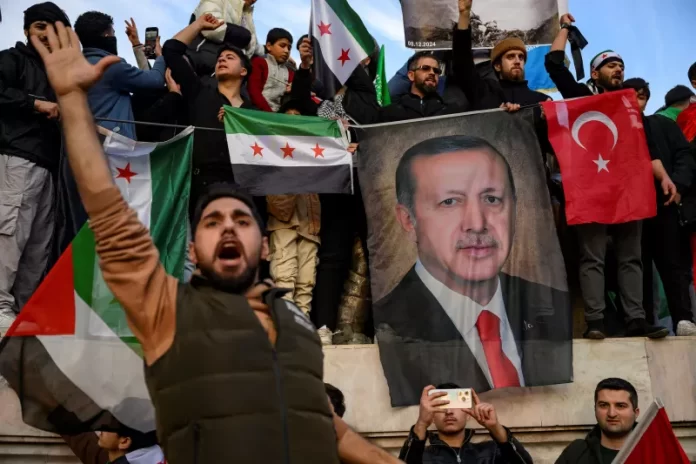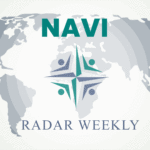NAVI Policy Paper 1: Directing NATO’s Strategy in Post-Assad Syria
PoC: Umit Kurt u.kurt@nato-veterans.org
Syria remains a focal point of geopolitical instability, with its post-conflict trajectory crucial for regional and global security. A new political landscape is emerging, with Hayat Tahrir al-Sham (HTS), an Islamist group, now in control. NATO’s engagement in Syria should align with its security, stability, and cooperation principles. The collapse of the Assad regime presents both challenges and opportunities for NATO and its allies, particularly in ensuring Syria’s sovereignty, facilitating an inclusive political transition, and preventing the resurgence of extremist groups.
This policy paper outlines key guiding principles and recommendations for NATO’s strategic direction in post-Assad Syria, emphasizing the necessity of a coordinated international approach to Syrian sovereignty and territorial integrity, reconciliation and reconstruction, counterterrorism, regional stability and security, and inclusive governance. By strengthening internal cohesion, maintaining a strategic presence, and fostering regional partnerships, NATO can contribute meaningfully to Syria’s stabilization.
Additionally, enhanced NATO-EU cooperation in the Southern Neighborhood is vital to aligning resources, diplomatic efforts, and security initiatives to ensure Syria’s long-term recovery and integration into the international system. These recommendations align with the May 2024 NATO report, which stresses political dialogue, cooperation, and a long-term commitment to the region.
Guiding Principles
- Secure Syrian Sovereignty and Territorial Integrity: Focus on preserving Syria’s territorial integrity and sovereignty.
- Reconciliation, Human Rights, and the Rule of Law: Emphasize reconciliation, protect human rights, uphold the rule of law, and ensure accountability for past atrocities.
- Syrian-Led Process: Acknowledge that the Syrian people must decide the future of Syria through an inclusive and transparent approach.
- Strategic Presence: To enhance security and aid local partners, it’s important to maintain a strategic military presence in Syria. A unified NATO presence could dissuade harmful actors and foster lasting stability. Drawing from NATO Mission Iraq’s success, consider establishing a permanent NATO mission aimed at training and capacity-building in defense and security for Syrians to be deployed at their invitation.
- Inclusiveness: Precise transition to a non-sectarian government that includes all Syrians, regardless of their background.
- Regional Stability: Focus on actions that enhance regional stability by collaborating with local partners to thwart the reemergence of terrorist groups and tackle the underlying causes of conflict.
- Humanitarian Assistance: Focus on the humanitarian crisis by prioritizing the safety of displaced individuals.
- Support vulnerable populations while ensuring aid distribution is not dominated by hardline groups.
- Long-Term Commitment: Understand that the situation in Syria demands a long-term commitment to achieving stability and reconstruction.
Key Recommendations
Internal NATO Measures
- Prioritize Cohesion and Collective Action: Aim for a decisive and unified approach among its members concerning Syria to exert effective policy pressure on Syrian and other actors. Disagreements and a lack of coordination among NATO members have enabled Russia and Iran to expand their influence in the region.
- Acknowledge the Consequences of Inaction: Understand that inaction in Syria leads to consequences, including enabling Russia and Iran to strengthen their presence in the Middle East.
- Maintain a Strategic Presence: To support local partners and enhance security, consider maintaining a strategic military presence in Syria. A coordinated NATO presence could deter malign actors and contribute to long-term stability.
- Maintain Flexibility in Strategic Planning: Conduct regular assessments to adapt strategies to emerging threats and opportunities while preserving regional stability and alliance cohesion.
- Streamline Processes: Simplify NATO processes and improve transparency to enhance its image among neighboring regions.
- Institutionalize Focus on the South: Broaden the Southern Neighborhood strategy to foster greater cooperation with countries in Africa and the Middle East. Strengthening regional defense capacities can counter external influences and ensure NATO’s relevance in these areas.
Prioritize Syrian Sovereignty and Territorial Integrity
- Preserve Territorial Integrity: Support preserving Syria’s territorial integrity and sovereignty.
- Support a Syrian-led Political Process: Enhance engagement with regional partners and relevant groups within Syria to promote a Syrian-led resolution to the conflict. External solutions should be avoided in favor of approaches that respect Syria’s sovereignty and reflect the aspirations of its people.
- Inclusive Governance: Emphasize inclusive governance, accountability, and reconciliation to break cycles of violence with a key focus on building local capacity for security and encouraging good governance while also coordinating with the EU and UN.
De-escalation, Reconciliation, and Justice
- Encourage all parties in Syria to minimize military actions, prioritize protecting civilians, and prevent displacement and disruptions to humanitarian access.
- Support a Syrian-led reconciliation process that emphasizes inclusive governance, accountability, and the protection of human rights for all Syrians, including women and minorities. The UN should facilitate this process and align with UNSCR 2254, concentrating on establishing credible, non-sectarian governance and creating a framework for a new constitution, followed by free and fair elections.
- Promote dialogue and cooperation among all parties in Syria to cultivate a peaceful and stable transition.
- Emphasize a cooperative spirit with southern partners and support efforts to build trust through long-term commitments, improved representation, and recognition of the different contexts within the region.
- A key aspect of reconciliation is protecting the rights and safety of returning refugees and ensuring that humanitarian aid reaches those in need.
- The focus should be on long-term partnerships and delivering tangible benefits that address the root causes of conflict.
- Avoid actions that could contribute to further conflict or instability.
Considerations Regarding HTS
- Acknowledge HTS’s Emergence: Recognize that HTS has become a leading domestic player in Syria following Assad’s fall. However, this does not imply recognition or legitimacy.
- Monitor HTS Actions: HTS should be evaluated based on its actions, not words, concerning the protection of civilians and minority groups as well as the implementation of a peaceful transition of power.
- Maintain Communication: Keep communication open with HTS to encourage an inclusive transition and to ensure that the group honors its commitment to protecting minorities and collaborating with the international community.
- Consider De-listing Criteria: Decisions about lifting sanctions should depend on HTS’s actions and progress toward a peaceful transition.
Engage with Regional Partners and the EU -NATO Cooperation
- Engage with Türkiye: Collaborate closely with Türkiye, acknowledging its influence, to promote support for groups striving for tolerance and peace.
- Dialogue with SDF: Foster dialogue among all parties, including the Kurdish-led Syrian Democratic Forces (SDF), to avert further conflict and ensure stability in the northeast while respecting the NATO members’ security concerns.
- Engage with Arab States: Work with Gulf Arab states to secure financial resources and legitimacy for Syria’s reconstruction.
- Address Other Regional Tensions: Tackle actions by regional actors focusing on de-escalation, compliance with international agreements, and the pursuit of lasting regional stability.
- Engagement with Regional Stakeholders: Foster collaborative diplomatic outreach to Gulf Arab states, Türkiye, and the wider Middle East to ensure cohesive efforts in supporting a stable, inclusive, and sovereign Syria.
- Given Syria’s strategic importance within the Southern Neighborhood, NATO and the EU must coordinate efforts to ensure a stable and inclusive post-Assad transition. The EU’s economic and diplomatic leverage, combined with NATO’s security capabilities, can establish a comprehensive stabilization framework. The following recommendations highlight areas where NATO-EU cooperation can be most effective:
- Joint Political and Security Framework: Create a NATO-EU working group focused on Syria to synchronize security measures, capacity building diplomatic engagements, and reconstruction efforts.
- Counterterrorism Coordination: Align NATO’s military strategies with the EU’s counterterrorism policies to prevent the resurgence of groups like ISIS and support localized security forces.
- Integrated Humanitarian Efforts: Develop a NATO-EU humanitarian coordination mechanism to streamline aid distribution, avoid duplicating efforts, and ensure aid reaches the most vulnerable populations.
- Economic Stabilization and Reconstruction: Leverage EU economic assistance along with NATO’s strategic engagement to support infrastructure rebuilding, governance capacity-building, and employment initiatives to avert further displacement and radicalization.
- Sanctions and Compliance Monitoring: Establish a joint NATO-EU monitoring body to assess Syria’s compliance with international agreements, linking sanctions relief to tangible progress in political transition and human rights protections.
Security and Counterterrorism
- Monitor and Prevent Resurgence of ISIS: Implement measures to avert the resurgence of ISIS and other extremist groups.
- Engage in dialogue with Ankara to balance Türkiye’s security concerns with the necessity of controlling violent ISIS fighters.
- Leverage the appointment of the Special Coordinator for Counterterrorism to strengthen NATO’s counter-terrorism efforts in the region and maintain contributions to the Global Coalition against Daesh.
Humanitarian and Economic Support
- Increase Humanitarian Aid: Continuously enhance humanitarian aid to Syria, with an emphasis on early recovery, essential services, and infrastructure.
- Sanctions Relief: Initiate talks regarding sanctions relief for Syria, contingent upon tangible progress toward a peaceful transition on the ground.
- Aid Distribution: Prioritize keeping aid distribution free from the influence of hardline groups and ensure that assistance reaches those in greatest need.
- Reconstruction Support: Investigate avenues for facilitating Syria’s reconstruction while making any assistance conditional on an inclusive political process.
Conclusion
The situation in Syria is complex and rapidly evolving. The post-Assad period in Syria represents a crucial juncture for international security, requiring NATO to adopt a long-term, coordinated strategy. NATO must act decisively and clearly understand the associated risks and opportunities.
By adhering to the principles and implementing the recommendations outlined in this paper, NATO can play a crucial role in ensuring a more stable, peaceful, and prosperous future for Syria and the broader region. A long-term commitment and mutual engagement are essential for success in this endeavor. Solutions that prioritize Syria’s integrity and independence while addressing the security concerns of neighboring countries should be grounded in a resolution that belongs to the Syrian people. NATO must prevent both Syrian and external actors from attempting to influence this ultimate goal. Furthermore, a strengthened NATO-EU partnership is essential for aligning military and diplomatic efforts, ensuring a comprehensive approach to Syria’s reconstruction and stabilization.
NATO must recognize the consequences of inaction and the necessity of proactive engagement in shaping Syria’s future. A strategic presence, regional collaboration, and humanitarian commitment will be key to achieving sustainable peace. By integrating its efforts with EU policies and regional stakeholders, NATO can help foster a secure, inclusive, and stable Syria that contributes to broader Middle Eastern and global stability.
PoC: Umit Kurt, u.kurt@nato-veterans.org
The NAVI Research Institute is the research division of NATO Veterans Initiative - NAVI that provides a unique perspective to transatlantic leaders and societies on peace and security through the lens of NATO's founding principles of rule of law, democracy, human rights, and individual liberties. The NAVI Research Institute was officially established by the NAVI Board on July 16th, 2023.


